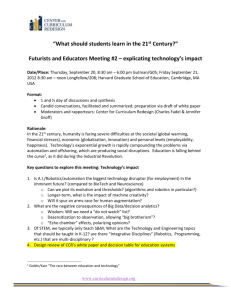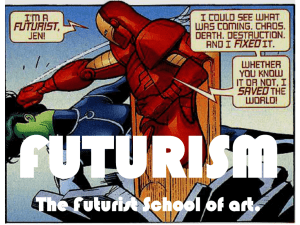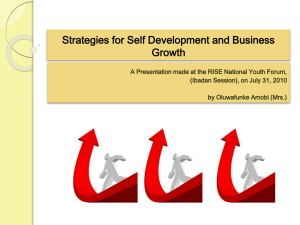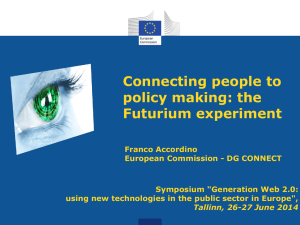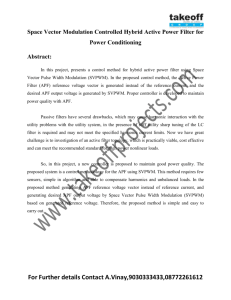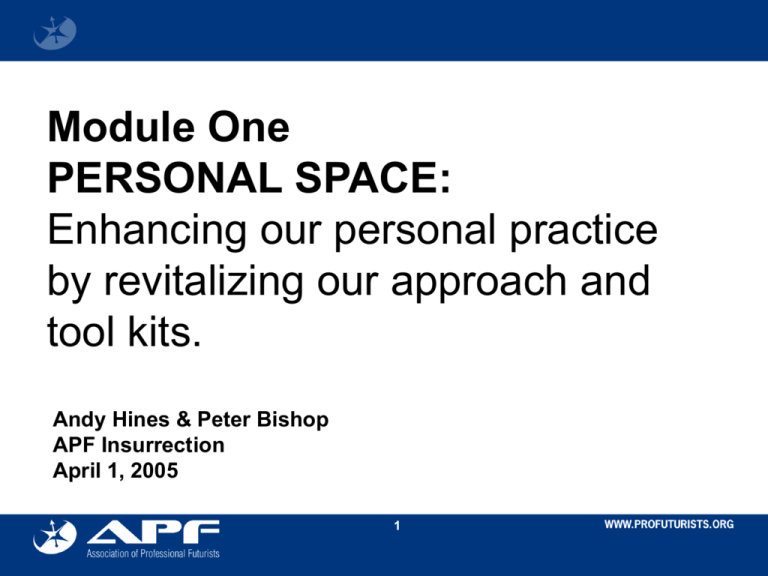
Module One
PERSONAL SPACE:
Enhancing our personal practice
by revitalizing our approach and
tool kits.
Andy Hines & Peter Bishop
APF Insurrection
April 1, 2005
1
What do clients need?
Is there a searing pain?
What do you get in return?
The Personal
Brand
Client
Self
What do we/you provide
to satisfy the need and ease the pain?
What’s the difference?
What’s the difference?
Futurists
Others
Competitors
2
Branding Questions
What are the most important
reasons you do futures work?
What are your strengths
compared to other futurists?
What distinguishes you from
non-futurist competitors?
What challenges do your
clients face? What is their
“searing pain?
How do you meet that “searing
pain?
3
The Competency & Tool Kit
Inventory
Andy Hines & Peter Bishop
APF Insurrection
April 1, 2005
4
What Is a Core Competence?
• A competence is:
• A combination of skills and experience vested in people; an
accumulation of learning supported by technology, processes, and
values.
• A core competence is one that:
• is integral to an organization’s success
• yields a fundamental customer or cost benefit
• provides competitive differentiation
Source: Strategos, www.strategos.com
5
© 2000 by Navigant Consulting, Inc. All rights reserved.
Disney: A Core Competence Perspective
“Joy of Use”
- Escapism
- Magic
- Fun
Consumer
Benefits
Consumer
Products/
Services
Core
Competencies
Animated
Features
Movies
“Community”
- Security/Safety
- Values/Wholesomeness
Theme
Parks
Resorts
“Story Telling”
Cruise
Operations
Planned
Communities
“Set Management”
Ride Systems
Engineers
Skills/
Technologies/
Assets
Executive
Retreats
Architects
Sculptors
Costume
Designers
Landscape
Designers
Operations
Engineers
Painters
Audio/Visual
Engineers
Project
Managers
Customer
Services
Facilities
Managers
Logistics
Animatronics
Designers
Source: Strategos, www.strategos.com
Graphic
Artists
6
Diagnosing Core Competencies:
Landmark Achievements/Successful Projects
• Identify several landmark achievements of your
business over the past 5-10 years.
• For each landmark achievement, identify three types
of enablers
•
•
•
•
Approach
Tools
Skills
Styles
• Look for commonalities clues to generate 2-3
candidate core competencies
Source: Strategos, www.strategos.com
7
Tools (circle and/or add in)
Category
Tools
Visioning
integral (meta-method) issue analysis, critical futures
Scanning
content analysis, Delphi, environmental scanning, leading/lagging
indicators, trend tracking
Forecasting
causal layered analysis, cross impact analysis, emerging issue
analysis, framework forecasting, futures wheel/ implications analysis,
gaming/simulation, historical analogy/pattern recognition, morphological
box/FAR/GBN, scenario development (general), stakeholder analysis,
systems analysis, technology forecasting/roadmapping/ patent
analysis/sequence analysis, trend [impact] analysis/extrapolation
Planning
appreciative inquiry, backcasting, creative imagery, strategic planning,
action planning, visioning, visualization
Acting
change management, coaching, consulting, issue management,
leadership
8
Skills Worksheet (circle and/or add in)
•Research
•Facilitation
•
Finding
•
Group process
•
Reading, understanding, citing
•
Teamwork
•
Analyzing
•
•
Synthesizing
•Current assessment / awareness
•
Interpreting, drawing conclusions, making inferences
•
Research, historical, current and future conditions
•
Scanning, keeping up to date with new developments
•
•Thinking
•
•
Critical thinking
•Foresight
•
Systems thinking
•
Systems models
•
Creative thinking
•
Judgmental tools
•
Time series analysis
•
Qualitative scenarios
•
•Decision making
•
Values clarification
•
•
Decision analysis
•Planning
•
•
Mission & Vision
•Communication
•
Values
•
Speaking
•
Strategic plans: goals, measures, strategies
•
Writing
•
Operational plans: objectives, tasks, personnel, schedule, budget
•
Visualizing
•
•
•Development
•Calculation
•
Change management
•
•
Project management
•
9
Futures Skills (circle and/or add in)
•Current assessment / awareness
• Research, historical, current and
future conditions
• Scanning, keeping up to date
with new developments
•Foresight
•Planning
• Mission
• Vision
• Values
• Strategic plans: goals, measures,
strategies
• Judgmental tools
• Operational plans: objectives,
tasks, personnel, schedule,
budget
• Time series analysis
•Development
• Qualitative scenarios
• Change management
• Systems models
• Project management
10
Styles
Leader
Oriented
Coercive
Pacesetting
Authoritative
Democratic
Affiliative
Participant
Oriented
Coercive leaders demand immediate compliance
Authoritative leaders mobilize people toward a vision
Pacesetting leaders expect excellence and self-direction
Affiliative leaders create emotional bonds and harmony
Democratic leaders build consensus through participation
Coaching leaders develop people for the future
Source: Daniel Goleman “Leadership That Gets Results,” HBR, March-April 2000.
11
Worksheet: Landmark Achievements
Competence
Achievement 1
Achievement 2
Achievement 3
Achievement 4
Achievement 5
Approach
Tools
Skills
Styles
Source: Strategos, www.strategos.com
12
The Competencies
The common elements across the achievements were:
13
Brand Positioning Example
The Association of Professional Futurists is a growing
community committed to leadership, excellence and
innovation in foresight.
Statement
Pillars:
2-3 words
Unique Perspective
Thriving Community
Professional
Excellence
Summary
descriptive
phrase
APF members provide a unique
perspective to anticipate and
influence the future.
The APF supports thriving
communities of practice that
provide opportunities for
professional growth.
The APF sets the standard of
excellence for professional
futurists.
Examples:
bullets
Tag Line
Understanding of change
Professional networking
Membership standards
Long term view
Communities of practice
Professional development
Alternative futures
Participatory
New Best practices
Holistic orientation (systems
thinking)
Shared learning
techniques
Diverse perspectives
Code of ethics
Interdisciplinary thinking
Client focus
By futurists, for futurists
14
Brand Positioning Worksheet
Statement
Pillars
Summary
Examples
Tag Line
15




